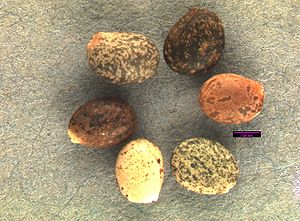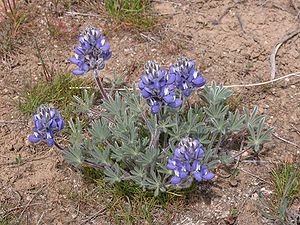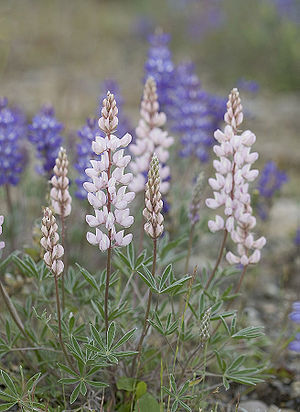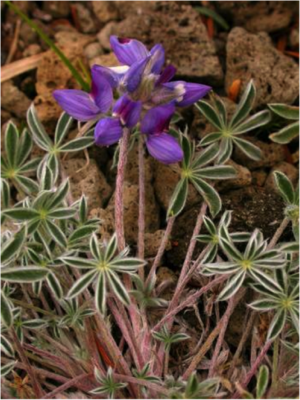Difference between revisions of "Lupinus lepidus var. lepidus"
| Line 33: | Line 33: | ||
[[File:LULE AnitaGoodrich veg avg.jpg|300px|thumb|left|"Lupinus lepidus"]] <ref>[Center for Naural Lands Management]</ref> | [[File:LULE AnitaGoodrich veg avg.jpg|300px|thumb|left|"Lupinus lepidus"]] <ref>[Center for Naural Lands Management]</ref> | ||
| − | [[File:LULE RodGilbert veg good.jpg|300px|thumb|right|"Lupinus | + | [[File:LULE RodGilbert veg good.jpg|300px|thumb|right|"Lupinus lepidus"]] <ref>[Center for Naural Lands Management]</ref> |
| + | [[File:Lupinus lepidus.png|300px|thumb|left|"Lupinus lepidus"]] <ref>[Center for Naural Lands Management]</ref> | ||
Revision as of 11:23, 23 April 2012
Plant
DESCRIPTION:
Prairie lupine is a small perennial lupine of diverse form and habitat in the Pacific Northwest. It ranges from matted low growing forms to erect plants ranging from 10-35 cm high. The palmately compound leaves have 5-7 oblanceolate leaflets. The leaflets range from 1-4 cm long and are noticeably hairy on both surfaces. The flowers are dark blue to purple, sometimes white in color with a lighter banner. The banner is well reflexed from the keel and is not hairy on its surface. There are five known varieties of Lupinus lepidus. Variety lepidus is best described by it’s extended racemes growing above the longest leaves and the length of it’s flowers between 11-13mm long. [1]
Seed
Abbreviation: LULE
Seed sample from: 2011
Average Measurement: 2.7 x 1.8 x 1.3
Measurement Range: L: 2 - 3, W: 1.5 - 2, D: 1 - 1.5
Features
Color: Seeds ranging in color from off-white, tan, brown, to gray. Lots of variation in color. Patterned with mottled speckling which is light to dense. Speckles light brown to dark brown.
Surface: Seed surface is smooth and glossy. Some seeds have small concave pockets. [2]
Latitudinal Cross Section: elliptical ![]()
Longitudinal Cross Section: elliptical ![]()
Basic Explanations and Assumptions:
The dimensions for the seeds are length x width x depth. The location of the hilum is used as the base of the seed, and the length is measured from hilum to the opposite apex. Where a style is present, the length is measured from the hilum to the bottom of the style. Width is measured at a right angle to the length at the widest part. Depth is measured at a right angle to the intersection of height and width lines.
Measurements included are the mean average for each measurement of ten separate seeds.
All measurements in millimeters unless otherwise noted.




